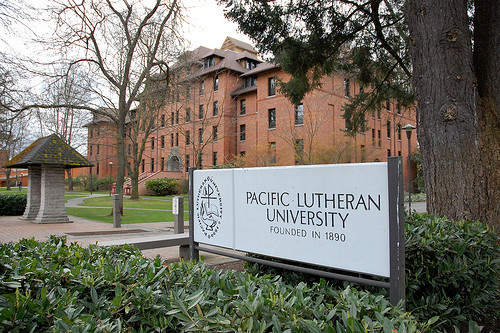
Brennan LaBrie
News Editor
As it became increasingly apparent this past summer that the 2020-21 school year would be mostly, if not entirely, online, many students at Pacific Lutheran University wondered if the university would lower tuition costs. After all, as students worldwide discovered this past spring, *online school is a significantly inferior product to in-person school.
At the time, some colleges across the country were lowering tuition costs for this school year, by up to 10%, including Georgetown, Princeton and the University of Pennsylvania.
PLU’s administration was following these moves closely, and meeting every day to explore ways in which to improve student experiences and retention during an online-heavy year. Lowering tuition costs was among the options they weighed.
What they finally decided on—offering an extra year of tuition-free college to all PLU students who remain fully enrolled this school year—took many by surprise. It made waves throughout the PLU community and local media, being featured by such outlets as KIRO 7 News. After all, PLU was just the second university in the country, and first in the Northwest, to make such an announcement.
However, despite this enticing offer, tuition increased for students as usual, and at a higher rate than in year’s past. Many students wondered why PLU went with an entire extra year of tuition-free college in the future, as opposed to one year of reduced or zero tuition right now.
“It was a financial reason, to be perfectly honest,” said Mike Frechette, Dean of Enrollment Management & Student Financial Services. “We budget a certain tuition revenue from each student. To offer free tuition right now, before students have actually paid for 6 semesters or 8 semesters, unfortunately just wasn’t feasible from a financial perspective, nor was just lowering tuition.” The six and eight semesters refer to the amount of time in which PLU expects transfer and four-year students, respectively, to finish their course of study.
The university, as it does every year, had to increase tuition in order to keep up with the rising costs of running a university, which include minimal pay increases to faculty, overhead and utility charges, building maintenance, improving student services, and taking into account the gradual rise in cost of living nationwide. The fallback of COVID-19 contributed significantly to the university’s reliance on tuition dollars to finance the university, as the revenue from offering room and board plummeted with all dorm rooms on campus becoming singles.
“Financially there was some ground we had to make up, basically,” Frechette said.
Frechette acknowledged the widespread financial challenges facing families right now, especially considering the high rate of job loss during the pandemic. To that end, the university is pointing families towards the special circumstance process in which students can appeal for more aid-based * on changes in family income. However, for students with families not suffering from those challenges, the university needed their money badly in the short term. Therefore, tuition was raised by 5% for the 2020-21 school year.
“We do try to minimize our tuition increases as much as we can, and they’re usually no more than 3-4% because we know it’s a strain for students and families,” Frechette said.
“Unfortunately it was a reality that we had to increase tuition just to keep up with expenses,” Frechette said. “But we wanted to do something for students and we thought a PLUS Year would be something really cool that a lot of students would want to take advantage of. It would allow them to slow things down and spread out their intensive classes, maybe add a major or a minor, or to work in some courses or a study-away * program that they never thought was possible before.”
In a September “Fireside Chat” with the PLU community, President Allan Belton echoed Frechette’s words, explaining to the virtual audience that as a non-profit, PLU barely breaks even in a good year, and in a year such as 2020, breaking even wasn’t even a sure thing.
It was Belton who first brought forth the idea of the PLUS year to PLU administration this past summer, after he received an email about another college in the midwest who announced a free year of college to their current students.
“President Belton was so excited about it that the next day he called a meeting and we started structuring the program that very same day,” Frechette said.
In the Fireside Chat, Belton explained that over the course of the daily administrative meetings concerning PLU’s options this school year, it became clear that any decision (design, program, structure) on classes for the fall, be it all online, in person or blended, would not provide the PLU experience that students paid for and hoped for.
“So the question became what can we do?” Belton said. “And somebody said ‘can we just keep them around longer?’ So we did. The whole purpose of that is: Keep your momentum. Don’t take a year off, because if you do take a year off, you’re likely to not get your degree completed. We also figured that an extra year provides a lot of certainty where there is no certainty.“
Belton also sees the PLUS Year as offering student athletes and musicians who may not get much, or any, meaningful performance or competition time this year an extra year of eligibility to fulfill their goals before graduating. He also sees the PLUS Year as giving students who don’t see much hope in a depleted job market due to COVID an extra year to fine tune their skills and add areas of expertise before going out into the world.
The PLUS Year does come with numerous asterisks, however. One major asterisk is that students may not use it for semester-long study aways, only January (J)-Term programs. The reasons behind this are purely financial as well.
When a student is accepted into a semester-long study away program, the PLU office of Student Financial Services sends the student’s tuition money to the Wang Center, who applies it to the program’s fees. These include lodging, insurance, and travel and food stipends, among other things.
“If we have no tuition dollars to rely on, we don’t have the funds to pay for the expense of your semester study away,” said Tamara Williams, director of the Wang Center. “It’s not feasible, especially given the financial burdens of COVID,”
J-Term programs, on the other hand, are entirely covered by the students themselves through a program fee paid directly to the Wang Center. Because of this, students may study away during J-Term in their PLUS Year.
The Wang Center is advising students to fit in a study-away program before their PLUS Year.
Williams said that current seniors are most adversely affected by this decision, as all study away programs for this school year and next summer have been suspended, and those who planned on studying away before graduating may not be able to do so. The Wang Center is working with such students on J-Term 2022 programs and other opportunities, while encouraging semester program advisors to consider creating J-Term programs at current semester study away locations such as those in Norway, China, and Oxford, England.



















